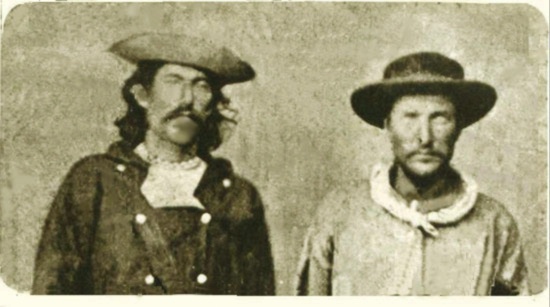Authors:
Historic Era: Era 5: Civil War and Reconstruction (1850-1877)
Historic Theme:
Subject:
Spring 2010 | Volume 60, Issue 1


Authors:
Historic Era: Era 5: Civil War and Reconstruction (1850-1877)
Historic Theme:
Subject:
Spring 2010 | Volume 60, Issue 1
Shortly before last Christmas, a prominent New York auction house put up for bid a collection of 63 postmarked envelopes and stamps that the daring riders of the Pony Express had carried 150 years ago. Experts estimated that the rare collection, owned by Thurston Twigg-Smith, an 88-year-old philanthropist and former publisher of the Honolulu Advertiser, might net $2.5 million. It drew $4 million.
That the Pony Express generated such income would have gladdened the hearts of the venture’s original founders—William Hepburn Russell, Alexander Majors, and William Bradford Waddell—who never made a dime from the business. The heroic, nearly 2000-mile delivery of mail across the country hemorrhaged money, from the first day a rider saddled up until the click of the transcontinental telegraph shut it down 78 weeks later.

The Pony Express was one of the most colossal and celebrated failures in American business history, but its legacy, as the sale at Robert A. Siegel Auction Galleries suggests, remains an enduring and revered piece of the Old West myth. Even today, old-timers in the remotest parts of the American West still speak of “the days of the Pony.” Few figures in that region’s history loom larger than those true riders of the purple sage, whom Mark Twain called “the swift phantoms of the desert.”
In its own day, the Express caused quite a stir. By beginning where the train and the telegraph line stopped at St. Joseph, Missouri, in 1860, the service closed an information gap that had long frustrated both coasts. The Pacific slope was a far country in those days: mail from the East took not days or weeks but many months to cross the nation by stagecoach or to be shipped around the stormy Cape Horn or through the fever-ridden Isthmus of Panama.
The Pony cut the time of moving information overland to 10 days or less, and on this count at least it proved a spectacular success. It initially cost customers $5 to send one letter, although rates would crumble as the firm desperately tried to generate business. Still, that was a lot of money in 1860, when a laborer in Kansas might make only that in a week. Patrons of the fast service thus tended to be banks, newspapers, and officials, including diplomats. “[The riders] got but little frivolous correspondence to carry,” noted Mark Twain.
“No enterprise of the kind in its day was ever celebrated on the Pacific coast with more enthusiasm than the arrival of the first pony express,” wrote historians Frank A. Root and William E. Connelley in The Overland Stage to California (1901). “News of the arrival of the first mail across the continent by the fleet pony was published with flaming head-lines in a number of the coast evening papers.” Huge crowds assembled in San Francisco to